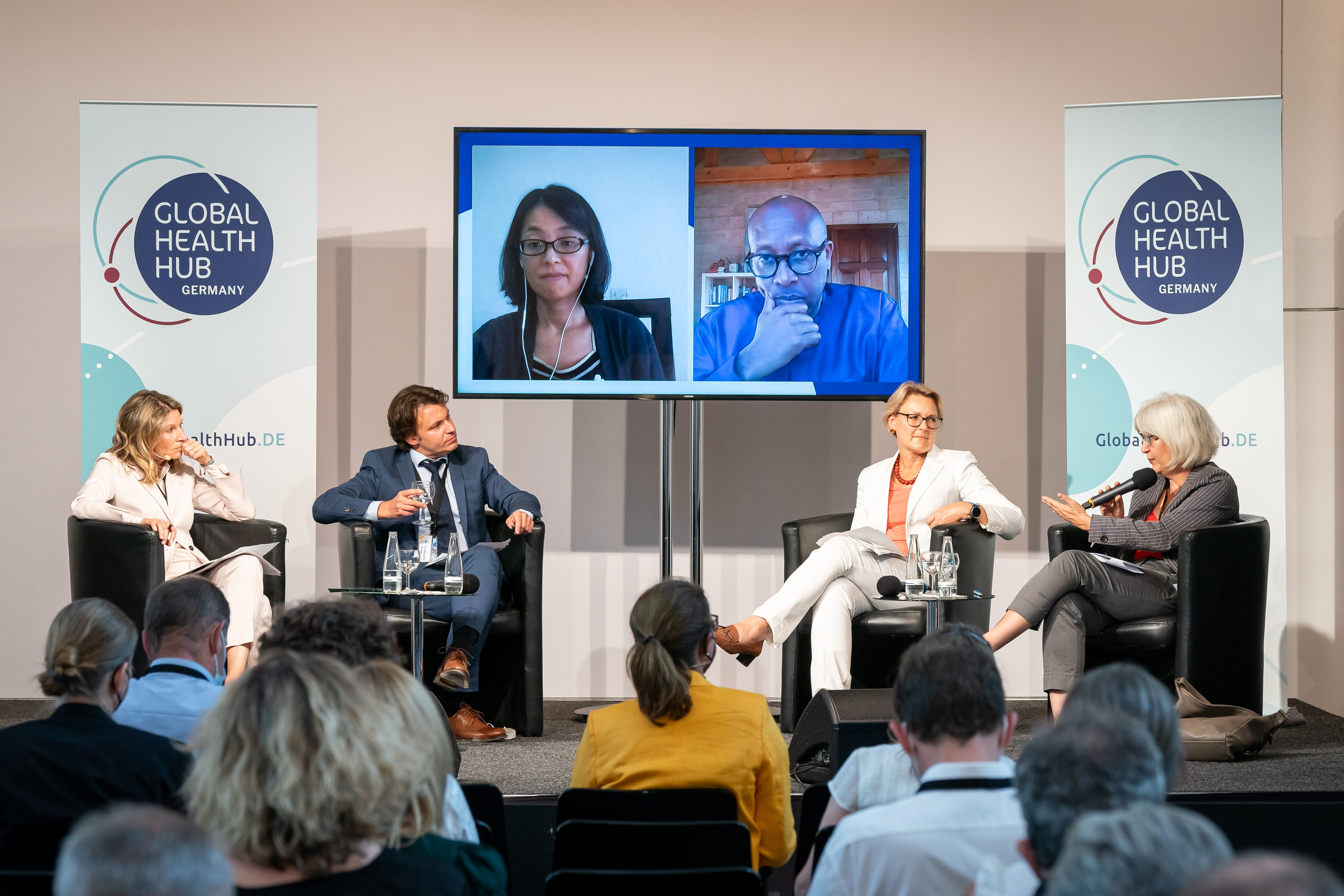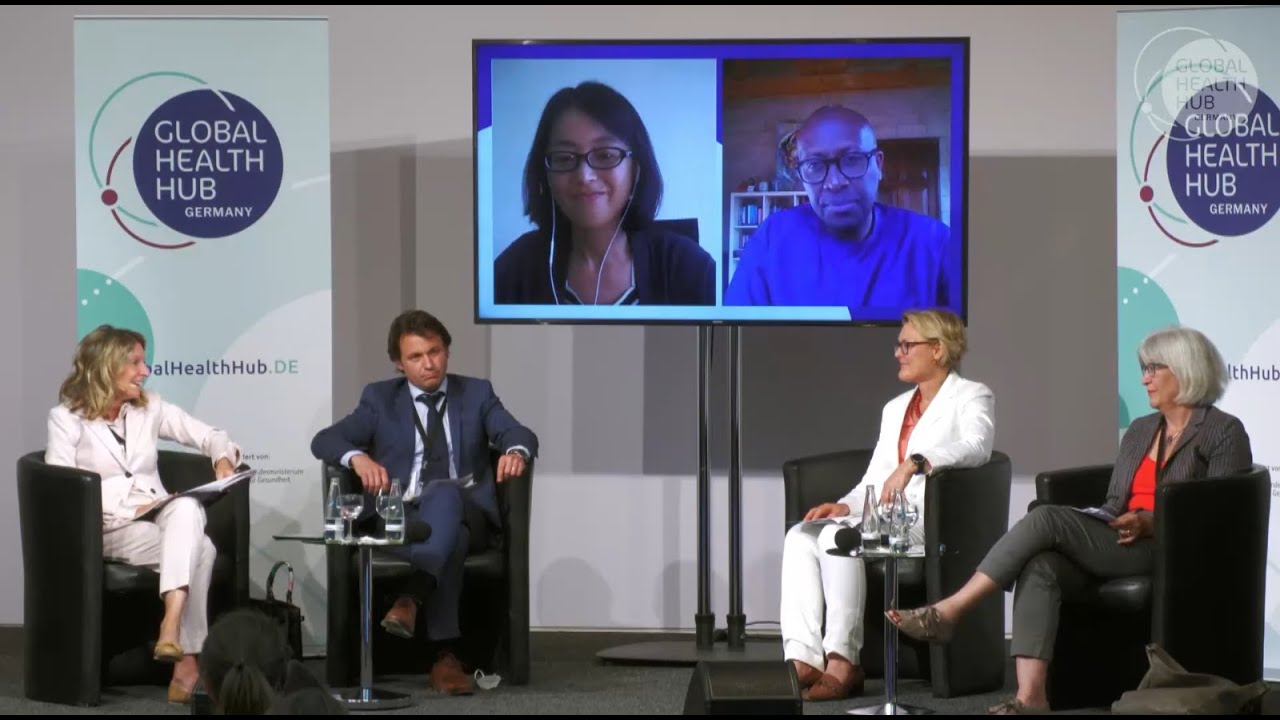Pandemic Preparedness & Response: Ten Recommendations for Future Health Policies

From left to right: Anja Langenbucher, Dr Christophe Bayer, Fumie Saito, Dr Githinji Gitahi, Dr Tania Rödiger-Vorwerk and Angela Bähr
On 5th July 2022, as part of the fourth Global Health Talk, the panel discussion "Pandemic Preparedness and Response during the German G7 Presidency – Review of the presidency and next steps" took place with both, representatives from German ministries and the G7 Engagement Groups (Women 7, Civil Society 7 and Think 7). The panel discussed the deliverables of the G7 Health and Leader’s Communiqué as well as the expectations for the G7 Pact for Pandemic Readiness. 10 recommendations for future health policies can be derived from the discussion, which can guide possible approaches as Germany enters its last months of the G7 Presidency.
The following experts contributed with their concrete expectations to pave the way for improved pandemic preparedness and response in future: Dr Tania Rödiger-Vorwerk; Deputy Director-General, Global Health; Resilience; Equality of Opportunity; Federal Ministry for Economic Cooperation and Development (BMZ), Angela Bähr, Deputy Chair of the VENRO board; Representative C7, Dr. Christophe Bayer; Head of Division Health Security, International Crisis Management, Federal Ministry of Health (BMG), Dr Githinji Gitahi; Group Chief Executive Officer, Amref Health Africa; Representative T7, Fumie Saito; Director, Global Advocacy, Japanese Organization for International Cooperation in Family Planning; Representative W7. The panel discussion was moderated by Anja Langenbucher; Director Europe Officer, Bill & Melinda Gates Foundation.
- The G7 Pact for Pandemic Readiness must be seen as a chance to align already existing initiatives to deal with future pandemics. The Pact should bring the G7 together to work on the main deliverables of strengthening surveillance systems and expert workforces globally.
- To ensure equitable and sustainable access to affordable vaccines, therapeutics, diagnostics and other essential medical goods, ACT-A remains the most important tool. The G7 Engagement Groups call decision-makers to evaluate its effects at regular intervals, as ACT-A has lagged behind its promises in the past.
- The establishment of the Financial Intermediary Fund (FIF) for Pandemic Prevention, Preparedness and Response (PPR), should contribute to a more comprehensive funding landscape strengthening health systems globally and focusing hereby on pandemic preparedness in LMICs. It is necessary to formulate a clear mandate and ensure inclusive governance structures for the operation of the fund.
- Decision-makers must prioritize to support countries in local vaccine production ensuring equitable and sustainable access to vaccines, therapeutics, diagnostics, and other essential medical goods. This requires political commitment to investment, capacity building, technology transfer, and infrastructure.
- The G7 committed to support 100 low- and middle-income countries (LMICs) in strengthening their core capacities required in the implementation of the International Health Regulations (IHR) for another 5 years. To reach this goal, decision-makers must ensure flexible financing mechanisms to allow the strengthening of local health infrastructure while putting a larger emphasis on prevention. These priorities should be discussed in the two upcoming meetings in 2022 that will lead to the formulation of the Pact.
- While dealing with the Covid-19 pandemic, decision-makers must prioritize health with a broader understanding. The replenishment of the Global Fund for AIDS, Tuberculosis and Malaria (GFATM) and its contribution to achieving Universal Health Coverage (UHC), as well as a well-financed WHO, is of utter importance. Likewise, the G7 must commit to further contribute to the Global Financing Facility for Women, Children and Adolescents (GFF) as well as the Global Polio Eradication Initiative (GPEI).
- Going forward, decision-makers should commit to innovative governance structures, particularly emphasizing the inclusion of LMICs and civil society in the decision-making processes. Likewise, the governance structure of ACT-A should become more inclusive.
- The progress for pandemic preparedness and response cannot diminish the health access in other domains – Decision-makers must commit to strengthening primary healthcare, continue to address noncommunicable diseases including mental health as well as neglected tropical diseases. Collective efforts to ensure comprehensive Sexual and Reproductive Health and Rights (SRHR) for all, gender equality as well as children’s health need to continue.
- As Japan takes over the G7 presidency, continuity of agendas should be ensured. Japan should use the political momentum for the topic of pandemic preparedness and further follow the objective of UHC, as laid out by Japan’s new Global Health Strategy. Similarly, the topic of pandemic preparedness and response should continue to be addressed in G20 formats.
- To stay accountable for the deliverables agreed upon, the G7 partners should regularly evaluate their impact and the fulfillment of their G7 ambitions. Deliverables from earlier Communiqués should not be forgotten while new goals are set. In the case of non-achievement of deliverables, the reasons for this non-achievement should be reflected upon in an active format and the evaluations should be used to guide future G7 ambitions.
